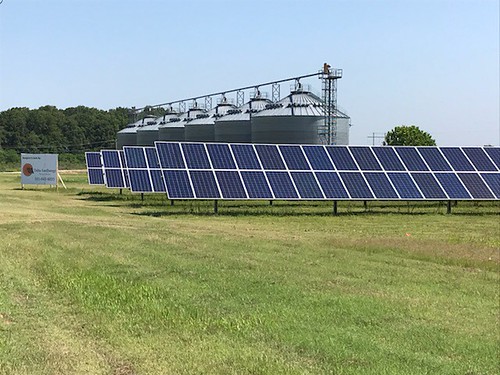Solar leases: National Ag Law Center guides outline what you need to know
By Sarah Cato
U of A System Division of Agriculture
Dec. 20, 2019
Fast facts:
- “Farmland Owner’s Guide to Solar Leasing” and “Understanding Solar Energy Agreements” available from National Agricultural Law Center
- Publications guide landowners through solar leasing agreements
- Both publications can be found at http://bit.ly/2ttjtBw
(316 words)
(Download this story in MS Word format here.)
FAYETTEVILLE, Ark. – With a spike in the solar industry, many landowners are leasing their property to solar developers as a form of extra income. However, these specialty leases present some unique legal concerns.
The National Agricultural Law Center has published two guides to help landowners navigate solar leases. “The Farmland Owner’s Guide to Solar Leasing” and “Understanding Solar Energy Agreements” are meant to help landowners fully understand the risk, challenges and responsibilities that come with solar leases. Each guide has a different focus.
Farmland Owner’s Guide to Solar Leasing
This guide serves as a tool to help landowners in general, but especially owners of farmland understand solar energy development and the solar leasing process. It covers topics such as property taxes, government programs, common legal documents and much more.
The NALC partnered with several authors, including Peggy Kirk Hall, Director of the Ohio State University Agricultural & Resource Law Program, Evin Bachelor, Senior Research Associate for the Ohio State University Agricultural & Resource Law Program, and Eric Romich, Associate Professor and Field Specialty for Ohio State University Extension to complete this guide.
Understanding Solar Energy Agreements
This guide, written by Shannon Ferrell, a professor at Oklahoma State University, covers many aspects of solar energy agreements that landowners should know when considering and negotiating leases. It discusses how agreements might affect other land usage, typical payment structure, the responsibilities of each party and much more.
“Leasing land for solar energy development is gaining popularity in some areas of the country,” NALC Director Harrison Pittman said, “and we want to help our stakeholders navigate this industry as easily as possible. As a result, we’ve partnered with experts in different parts of the country to develop two handbooks for landowners potentially interested in leasing their land.
Both publications can be found at http://bit.ly/2ttjtBw.
For more information on the National Agricultural Law Center, visit https://nationalaglawcenter.org/ or follow @Nataglaw on Twitter.
About the National Agricultural Law Center
The National Agricultural Law Center serves as the nation’s leading source of agricultural and food law research and information. The Center works with producers, state and federal policymakers, Congressional staffers, attorneys, land grant universities, and many others to provide objective, nonpartisan agricultural and food law research and information to the nation’s agricultural community.
The Center is a unit of the University of Arkansas System Division of Agriculture and works in close partnership with the USDA Agricultural Research Service, National Agricultural Library.
About the Division of Agriculture
The University of Arkansas System Division of Agriculture’s mission is to strengthen agriculture, communities, and families by connecting trusted research to the adoption of best practices. Through the Agricultural Experiment Station and the Cooperative Extension Service, the Division of Agriculture conducts research and extension work within the nation’s historic land grant education system.
The Division of Agriculture is one of 20 entities within the University of Arkansas System. It has offices in all 75 counties in Arkansas and faculty on five system campuses.
The University of Arkansas System Division of Agriculture is an equal opportunity institution. If you require a reasonable accommodation to participate or need materials in another format, please contact 479-575-4607 as soon as possible. Dial 711 for Arkansas Relay.
# # #
Media Contact: Sarah Cato
Communication Services
U of A Division of Agriculture
National Agricultural Law Center
(870) 815-9035
sscato@uark.edu
